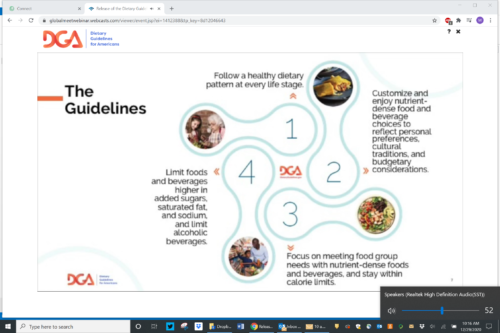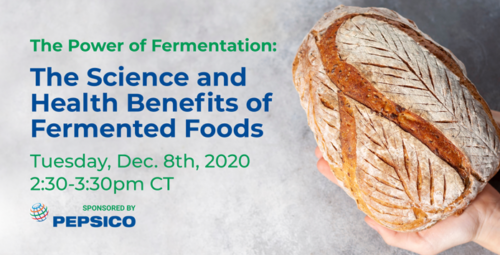Happy new year! (trying again)



So much for my plan to take the week off.
The new 2020-2025 Dietary Guidelines came out today. See them at DietaryGuidelines.gov. The new guidelines are much the same as the ones in 2015.

The big news: They paid no attention to the recommendations of the Dietary Guidelines Advisory Committee (I covered this in a previous post).
![]()
USDA and HHS overrode the scientific decisions of the DGAC. So much for “science-based” dietary guidelines.
I would love to know what the members of the DGAC think of this.
More later. These come from the USDA’s press release.
And here’s the USDA’s explanation, such as it is, of why it overrode the decisions of the DGAC on sugar and alcohol

Let’ keep doing what we can to get through this year and hope that we can all be together in the next one. Happy holidays!
(Thanks to VeggieQuest for the inspiring image)
Food Safety News reports that the European Commission is getting increasingly upset about fraudulent claims that specific food and supplement products will boost immunity and help protect against Covid-19 or even cure it.
The EC is worried about online advertisements. Food Safety News reported more than 350 cases of such claims in June. Now there are even more.
In the US, we mostly see this sort of thing—websites from the supplement industry telling you to take supplements. Here is what this one claims, with my comments in red.
Supplements can help you address nutrient insufficiencies or deficiencies in your diet—but can they help you fight COVID-19? Not as far as anyone knows.
While there hasn’t been specifically-targeted research to determine which—if any—nutrients should be FDA-approved to ward off the virus, [Indeed] supplements are an ideal way to keep your body and your immune system functioning at optimal levels. No, they are not. Food works much better.
As a result, many physicians and other health and wellness experts recommend beginning a simple supplement routine to ensure your body has the nutrients it needs to stay healthy. Many others do not, and neither do I.…The supplements you take during the COVID-19 pandemic may not be specifically developed to ward off the coronavirus. Right. So don’t expect them to work.
Still, research has shown that they all play an important role in boosting the immune system, preventing respiratory damage, strengthening the body against viral infections, reducing inflammation—or all of the above. This is true, but largely in experimental studies likely to have been funded by the supplement industry.
Obviously, I am not a fan of supplements. There just isn’t much evidence that they do anything useful for healthy people, and healthy people are the ones most likely to be taking them.
With respect to Covid-19, the best preventive strategy is avoidance (masks, distancing, etc).
The best immune-boosting strategy is to eat a healthy diet–largely (but not necessarily exclusively) plant-based, balanced in calories, and with minimal amounts of ultra-processed junk foods.
And let’s all hope the vaccination comes soon and works like a charm.
Happy holidays.
I got two notices this week about food lessons for kids. These tend to be education-y (stuffier and more theoretical than necessary, in my opinion), but easily adapted to doing fun stuff at home.
From the Edible Schoolyard Project: Edible Education for the Home. This involves the Cooking with Curiosity Curriculum for kids in grades six through nine. But the website has lots of other ideas, some gathered from collaborators. In the Resource Library, for example, I found a useful lesson on how to flip food—just the thing to do on a snowbound day.
From Food Corps: An huge bunch of food lessons for younger kids, kindergarten to fifth grade. Food Corps says these
Lessons include hands-on experiential activities to engage kids in learning about healthy food. This suite of 96 lessons are for grades K-5, and are organized through this learning progression by grade, season and theme…Each lesson was developed with input from FoodCorps service members, community partners and resource specialists, and have been evaluated and updated to reflect recommendations from our community of food educators. This suite of lessons is intended to guide food and garden educators to spark inquiry and love for healthy food and should be adapted to reflect the needs, identity and culture of the community in which they are taught.
It might be fun to start a worm bin to keep your kids busy under lockdown.
And if your kids ever get to go back to school, get the school to use the Healthy School Toolkit.
I haven’t written anything about the “revolving door” for a while, but it is now time. This term refers to government officials who leave to work for industry, and vice versa.
Recent example #1: The USDA has just announced that its Chief Economist, Robert Johansson, will be leaving USDA to become Associate Director of Economics and Policy Analysis for the American Sugar Alliance.
Recent example #2: The president-elect’s newly named secretary of the USDA is Tom Vilsack who was was USDA Secretary during the Obama administration. In 2017, he became executive vice president of Dairy Management, Inc.,and president and CEO of the U.S. Dairy Export Council, a Dairy Management subsidiary, at a salary close to $1 million. As the Milwaukee Journal Sentinal explains, this organization represents Big Dairy:
As the number of dairy farms nationwide has plummeted by nearly 20,000 over the past decade, there’s one corner of the industry doing just fine: The top executives at Dairy Management Inc., who are paid from farmers’ milk checks. The Illinois-based nonprofit is charged with promoting milk, cheese and other products — spending nearly $160 million a year collected through federally-mandated payments from dairy farmers. In 2017, a year in which 503 dairy farms closed in Wisconsin and 1,600 were shuttered nationwide, IRS records show 10 executives at the organization were paid more than $8 million — an average of more than $800,000 each.
The revolving door brings government experts into food trade associations where they can help food companies meet—but also avoid—regulations.
It brings food company executives into government where they can make sure that no government agency does anything inconvenient for the company’s bottom line.
Examples, alas, are legion. They are signs of government as usual, at a time when agricultural policy needs a huge rethinking.
My colleague, former doctoral student, and frequent correspondent, Dr. Lisa Young, sent me this choice item:

Now why would PepsiCo be interested in putting money into a conference on fermented foods?
Lisa has the answer to that one too: the company just bought a company that makes fermented beverages.
PepsiCo, Inc. (NYSE: PEP) announced today that it has entered into a definitive agreement to acquire KeVita, a leading North American creator of fermented probiotic and kombucha beverages. The transaction will expand PepsiCo’s health and wellness offerings in the premium chilled beverage space.
I’ll bet speakers at that conference talked a lot about the purported health benefits of drinks like these. And I’ll also be willing to bet that they did not talk about studies that show no benefit.
Just a wild guess.